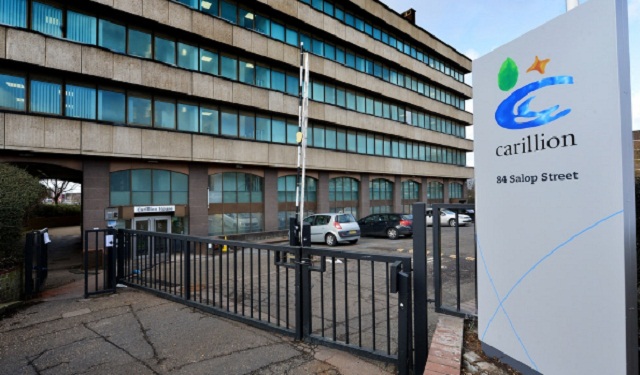
London, United Kingdom | AFP | The British government on Tuesday defended its decision not to bail out imploding construction-to-catering group Carillion, as criticism grew of its handling of the giant firm’s demise.
Carillion, which has a variety of private and public service contracts in Britain and employs 43,000 staff worldwide, announced its immediate liquidation Monday after the heavily-indebted company failed to secure a last-ditch financial rescue from the government and banks.
The government’s emergency response committee — known as COBRA — reportedly met for around an hour on Monday evening, with ministers from all affected departments attending, including finance minister Philip Hammond.
Treasury minister Lizz Truss on Tuesday told MPs that “it would be completely wrong for a public company that got itself in this state to be bailed out by the state.”
Thousands of British staff working for private-sector companies inside the stricken conglomerate will only have their wages paid until Wednesday under contingency arrangements.
Prime Minister Theresa May’s government has agreed taxpayers will foot a bill potentially running into hundreds of millions of pounds to continue paying the company’s 19,500 staff in public sector jobs.
“Our number one priority is making sure we supply those public services,” Truss said.
Carillion has public sector and private partnership contracts worth £1.7 billion (€1.9 billion, $2.35 billion), including providing school dinners, cleaning and catering at public hospitals, various construction works and maintaining 50,000 army base homes for the Ministry of Defence.
Hammond said Tuesday that the government had issued a line of credit to Carillion’s receivers “that enables (them) to operate the company’s public sector contracts.”
– ‘Pay the wages!’ –
The company has been struggling for some time and in July last year issued the first of several profit warnings.
Despite the red flags, the government continued to award the company major public contracts, including on a flagship new high-speed rail project, leading to increasingly scathing criticism.
“The collapse of Carillion is a watershed moment,” Labour leader Jeremy Corbyn tweeted Monday evening, alongside a video in which he lambasted private finance initiatives like those the government awarded to the company.
“It is time to put an end to the rip-off privatisation policies that have done serious damage to our public services and fleeced taxpayers of billions of pounds,” he added.
Reports suggest up to 30,000 small firms are owed as much as £1 billion (€1.1 billion, $1.4 billion) by Carillion.
Meanwhile the company has been roundly criticised for its executives’ remunerations, with several former directors to be paid hefty salaries and benefits for months.
Britain’s main lobby group representing business bosses called the pay packets “highly inappropriate” and accused them and shareholders of failing to provide “appropriate oversight”.
Roger Barker, head of corporate governance at the Institute of Directors, said “effective governance was lacking at Carillion”.
“We must now consider if the board and shareholders have exercised appropriate oversight prior to the collapse,” he added.
Business Secretary Greg Clark confirmed Tuesday that an investigation had been launched into the conduct of Carillion’s directors to see if they “may have caused detriment to those owed money, including workers and businesses affected”.
Signs at a Carillion construction site in Liverpool, north west England, were defaced with messages including “pay the wages” and “bust”.
Carillion said Monday “it had no choice but to take steps to enter into compulsory liquidation with immediate effect”.
The company, with operations also in Canada and the Middle East, had revenues of £5.2 billion ($7.1 billion, 5.9 billion euros) last year.
 The Independent Uganda: You get the Truth we Pay the Price
The Independent Uganda: You get the Truth we Pay the Price



